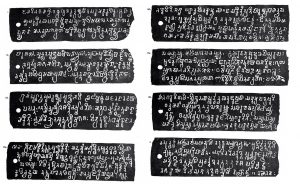
Cakratīrtha, Halsi, Karnataka. Copper plate charter of Ravivarman, inked impression.
Starts with an invocation to Jina and narrates the following. In former times the Bhoja priest Śrutakīrtti, who had acquired the great favour of the Kadamba king Kākutsthavarman, enjoyed the village of Kheṭa. When he died, there was the king Śāntivarman and his son Śrī Mṛgeśavarman gave the grant again for the sake of piety, and according to the direction of his father, to the mother of Dāmakīrtti. The eldest son of Dāmakīrtti was the door-keeper Jayakīrtti. A family had been established in the world by the cārya called Bandhuṣeṇa. In order to increase the good fortune and fame of himself and his family and for the sake of religious merit, he (i.e. Jayakīrtti), through the favour of king Ravi gave the village Purukheṭaka to the mother of his own father. The lord Ravi established the ordinance at the city of Palāsikā to the effect that the glory of Jinendra, which lasts for eight days, should be celebrated regularly every year on the full-moon of Kārttika from the revenues of that village, that ascetics should be supported during the four months of the rainy season, and that the worship of Jinendra should be perpetually performed by the pious countrymen and citizens.